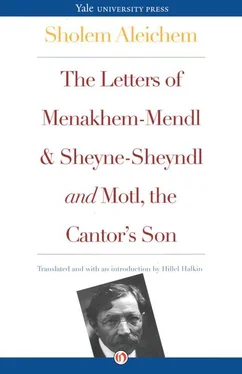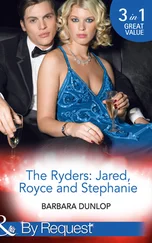The tailor from Heysen was right again. It cost us a kvawdeh, which are four to a dahleh, to get to see Pesye through some bars. She smiled at us with her sweaty face and double chin and my mother bobbed her head back. They both had tears in their eyes. Moyshe the bookbinder peered out from behind Pesye’s broad back. He had on a real hat instead of his old workman’s cap.
A minute later Yoyneh the baker turned up, looking as ornery as ever. He hadn’t changed a bit except for his beard, which — lord-a-mercy! — was gone. Riveleh-Chemise was there too. We wanted to shout hello, to hug, to kiss, to ask all kinds of questions. I was dying to hear about Bumpy and the rest of the gang, and about Brokheh’s little sister Alte. (You may remember we were engaged.)
Go sue! We’re still in detention. All we can do is look through the bars like prisoners or animals in the zoo.
I feel sorry for Pinye. He can’t look us in the eye. It’s a bad day for America. The way he goes around moping, you might think America was his personal property. He’s so mad that he’s begun a poem that goes:
I sure would like to see in hell a
Stinker by the name of Ella.
That made my brother sore because Ella sounds like Elye. Pretty soon he and Pinye were fighting. Then Brokheh got into the act with one of her sayings. “There’s no need to show a beaten dog the stick,” she said. Don’t ask me what that means.
Even without all the tears cried by my mother since my father died and we started wandering, you would think we had enough problems of our own. But no, she has to cry for the rest of Ella’s Island too! Every minute there’s a new sob story. My mother takes each one to heart. She wrings her hands, buries her face in them, and weeps to herself.
“You have no cause, Mama,” Elye says.
I agree. What’s there to cry about? Our homeless days are over. We’ve made it across the ocean. In an hour or two we’ll be free men in America.
But how can she resist? All the misery around her is like an ocean of tears.
I could talk all day and night and not get to the end of the hard luck we’ve seen on Ella’s Island.
For instance, here’s a case for you. A family of six, two parents and four children, are being held in detention. How come? Because one of the children, a twelve-year-old girl, can’t count backwards. Although she said “twelve” when asked how old she was, she couldn’t say how old she was a year ago. “Count from one to twelve,” she was told. She did. “Now count from twelve to one.” She couldn’t. Ask me and I’d have breezed right through it: twelveeleventennineeightsevensixfivefourthreetwoone. Big deal! But they won’t let that poor girl into America.
Her family is taking it hard. Their suffering could break a heart of stone. The mother stares at her daughter and sobs. Brokheh and Taybl can’t stop wiping their eyes.
Or how about this one. There was a woman with us named Tsivye. Her husband had disappeared, ditched her long ago. She sent letters trying to trace him and heard one day that he was in Sinsineteh. That’s a city in America. Well, off she goes to look for him. Aboard ship she’s told that when she gets to New York she should find someone to say he’s her husband. That way they’ll let her in.
The advice came from my old sea hand — I’ve told you about him. The tailor from Heysen put in his two cents too. The old sea hand arranged for a friend in New York to pretend to be the woman’s husband. But during the questioning the swindle came to light. The friend turned out to have another wife and was no more Tsivye’s husband than I’m her uncle.
I’m telling you, was there a scene! All Ella’s Island was up in arms. It gave Pinye a chance to settle scores with the tailor from Heysen. He couldn’t pass up a dig:
“Well, Mr. Needle Pusher, didn’t I tell you America wasn’t Russia? In America there’s no monkeying around. God bless Columbus!”
Did Pinye catch it from my mother! Brokheh gave it to him even worse. Even Taybl let him have it. They all but scratched his eyes out for laughing at such heartache. My mother treated Tsivye like a sister just to put Pinye in his place. But they’ll send her back to Europe all the same. Her phony husband is in for it too. They’re both in detention. My mother is beside herself.
And then there’s the young wife, all peaches and cream, on her way to join a husband in Bawstin. She was traveling with a child as pretty as a picture, a curly-haired little girl named Ketzeleh. I mean that was the nickname given her by her grandmother. Her real name was Keyleh. She could run and talk and sing and dance even though she wasn’t three years old. The Prince Albert was full of children, but Ketzeleh was the favorite. Everyone wanted to kiss her, hug her, play with her. Ketzeleh, come here! Ketzeleh, come to me!
Ketzeleh’s mother practically became one of our family. She never left my mother’s side. She told us her whole story and read us the letters her husband had written her. She hadn’t seen him for over three years. He had never seen his own daughter. He dreamed day and night of her, thought only of seeing his Ketzeleh.
At this point in the story Ketzeleh’s mother always broke into tears, my mother wiped her eyes, and I laughed, took Ketzeleh in my arms, and fed her pieces of apple and orange. I put them in her mouth and kissed her tiny warm fingers and she laughed back and stroked me with her little velvet hands.
If only I had had a box of paints! I would have painted Ketzeleh with her silky curls, her pretty blue eyes, and her face of an angel. My friend Mendl laughed at me for spending so much time with a china doll. I swear, that’s what he called her.
Well, we’re almost in America when Ketzeleh goes and gets sick. She …but it gives me the shivers just to think of it. That little girl took part of me with her when she went. I can’t talk about it. I don’t want to tell you what they did with her body. I’ll just tell you about her mother on Ella’s Island.
She didn’t cry. She had the same glassy stare for everyone. She didn’t answer when she was spoken to. It seemed she’d gone out of her mind. Now they’re sending her back. My mother is moving heaven and earth for her. My brother Elye can’t take it any more. He’s had a bellyful of her tears. Pinye must be hiding. You don’t see him anywhere.
Don’t think it’s only us Jews who have a hard time on Ella’s Island. Plenty of Christians do too. There was a gang of Italians with us on the Prince Albert, all wearing corduroy pants and wooden shoes. They sounded like a herd of horses when they walked. They were fine fellows, all of them, and crazy about us. They even had their own name for me. Piccolo Bambino, they called me and gave me nuts and raisins from their pockets. You bet I didn’t mind. I couldn’t talk to them because they knew as much Jewish as I know Italian, but I liked listening to them talk to each other. They hit their “r”s real hard. Buona serrrra! Mia carrrra! Prrrrego, signore!
Well, as luck would have it, one of them blurted out something dumb during the questioning. He told the truth, which was that they were coming to work for a bridge contractor who had signed them up in London. In America, it seems, that’s not allowed. Now they’re being sent back to Italy. They go around talking with their hands and buzzing their “r”s: Santa Marrrria! It doesn’t do any good. We all feel sorry for them. They have tears in their own eyes, too.
Mazel tov! There’s a wedding on Ella’s Island. Who’s the lucky couple? Wait and I’ll tell you.
The bride is from Chudnov, an orphan called Leah, a lovely, dark-haired, sweet-tempered girl. She spent the whole voyage with Brokheh and Taybl. The three of them were always together. They told me she was traveling by herself and didn’t know a soul in America. She had worked from childhood on, managed to save some money, and decided to emigrate. Chudnov was not for her. Her father was killed in a pogrom and her mother died of sorrow, leaving her on her own. But she could sew and stitch and knit and iron — she had golden hands, my mother said. Everyone felt sure she would do well in America. They were sure she would find a husband there, too. The best! Leah blushed and lowered her eyes when they talked about that.
Читать дальше












